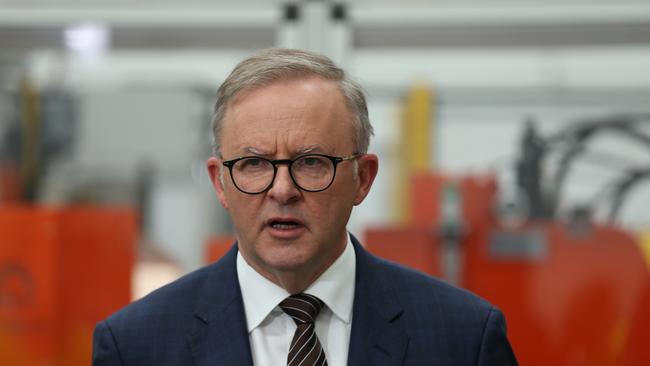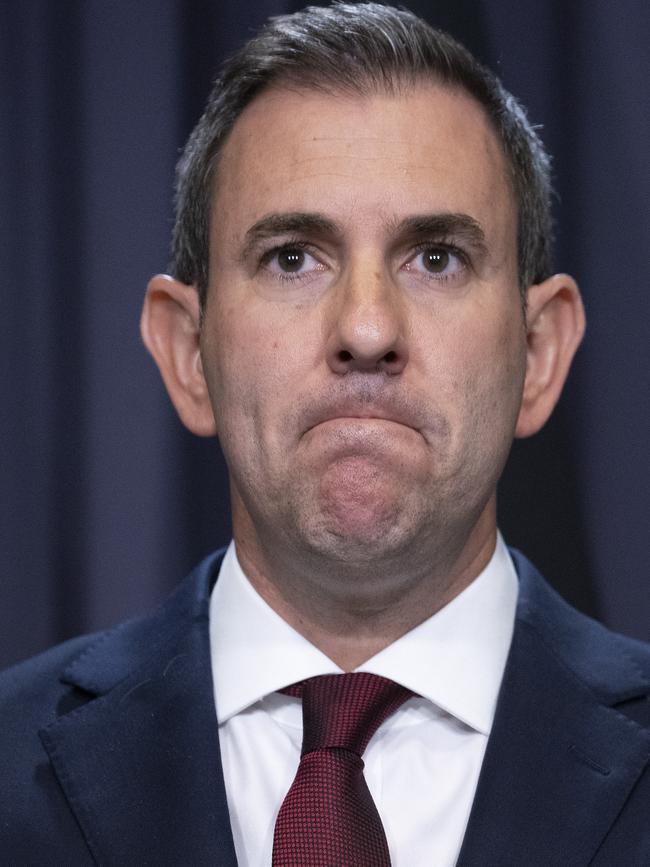Stop whingeing Albo: Tax reform the first step to budget repair
But we don’t have the intellectual acumen we once did. Public debate is fed by a dumbed-down fourth estate, reactionary social media and a political class not worthy of those who went before.

Laying the groundwork for major tax reform is the only economic game in town, at least it should be. Yet there are few signs we are close to having a proper debate on the subject.
The Albanese government can bleat all it likes about inherited debt levels, global economic headwinds, cost-of-living pressures, the need to curb pork-barrelling in the budget and rising inflation and interest rates. If it doesn’t embark on wholesale tax reform the whingeing is largely meaningless: Labor will have done too little about addressing all these concerns.
And it isn’t good enough simply to float repealing stage three income tax cuts. Whether you think good policy outcomes require their removal or honouring the election pledge to keep them is more important, tax reform needs to go much further.
Wealth and consumption taxes are needed to grow tax receipts sufficiently to cover spending priorities. By international standards, Australia is a high income-taxing country relative to our overall tax take. Dependence on income taxes needs to be reduced, which means finding other ways to tax.
Over-reliance on income taxes reduces productivity because higher income taxes can be a disincentive to work. It also quarantines the heavy lifting on tax to the generations at working age. With an ageing of the population this will become a starker problem in the years ahead.
Labor should be worried about the poll released this week in Nine newspapers suggesting Australians would prefer spending cuts over higher taxes in the budget. How such survey questions are framed can distort findings, but the results presented suggest the social-liberal consensus that post-materialism is on the rise may no longer be true.
One suspects the current economic climate is eroding such sentiments. Perhaps a new era of small government will soon emerge in the wake of the global economic tumult? That would certainly send the ideological left into a tailspin.
My concern is that as a country we don’t have the intellectual acumen to discuss tax reform seriously, as we once did. The superficiality of public debate is fed on all sides by a dumbed-down fourth estate, a reactionary social media and a political class not worthy of those who went before them. Most ideological contributors don’t have the academic pedigree they once did, turning public discussions into polemic arguments.
Somehow the government needs to find a way to punch through such blockages, to rise above such pettiness, because if it doesn’t it will let the country down. Australia’s tax system simply isn’t fit for purpose any more and it needs to be given the challenges on the horizon.

Death duties have been a pariah policy in Australia for decades, even though they operate effectively right around the world. What better time to pay more tax than when you’re dead? With the bonus of helping to address generational inequality.
Sin taxes are an opportunity to target consumption that is bad for people’s health and esteem. If the bad behaviour continues, the tax take improves. If bad behaviour reduces, then its cost on the health system, for example, comes down.
Consumption taxes need to be calibrated so as not to be too regressive, thereby disproportionately affecting the least well off. That can be achieved with concurrent increases in spending that target people on lower incomes. But it also can be achieved by imposing higher consumption taxes on luxury items, remembering that the wealthy consume more, hence they are the primary target of higher consumption taxes most of the time anyway.
To be sure, the spectre of wealth taxes can go much further than simply looking at death duties. Fewer capital gains tax concessions, increased taxes on high-end superannuation earnings and reductions in negative gearing are all easy fixes if the political class takes its job of governing seriously.
But Labor cannot legislate such changes during this term of government, for the same reason it shouldn’t repeal the stage three income tax cuts: because it promised not to. The need for tax reform is upon us, but the debate can be had during this term with the proposals for reform legislated in the next parliament after they have been taken to the next election.
Democracy matters, too. Trust in the political class is an important ingredient in a healthy political culture. Which is why it is incumbent on voters to do their collective part and delve deeper into the offerings from both sides of politics, taking seriously the democratic responsibility of who we elect.
If the Coalition in opposition plays politics and denies the broader need for reform, shame on them. John Howard made his name in politics during the 1980s dragging the Liberals in opposition into line to support much of the necessary macro-economic reforms Bob Hawke and Paul Keating championed. Peter Dutton regards himself as a disciple of Howard, so he should learn that lesson in showing substance.
His deputy, Sussan Ley, should be able to help. She holds a bachelor of economics and a masters in accounting alongside a second masters in taxation. Why she didn’t take on the shadow treasury portfolio after the election defeat is beyond me.
Bill Shorten’s agenda going into the 2019 election was a useful starting point for how the tax system might be recalibrated. But the fact he lost that election must tell us something about how that set of policies might need to change. He had plenty of good ideas as to how new taxes might be introduced to more efficiently target wealth accumulation, but he was hoping to bank those extra taxes to cover additional spending.
Perhaps the government needs to accept the survey findings that Australians don’t want higher taxes, they want less spending. The problem is that reducing spending means lowering the extent to which the long arm of government helps its citizens. We can spend more efficiently and we can end pork barrelling. But such savings barely touch the sides of the budget. They are fodder for a callow media illiterate in the basics of how budgets work. If people want lower spending rather than higher taxes, expectations of what government can do for us need to be tempered.
If all Labor serves up during this term is tinkering to reduce pork barrelling, marginally higher corporate tax returns by targeting multinationals and a late overturning of the stage three income tax cuts, it will have missed a necessary opportunity to reform the wider tax system. That, by the way, must include tackling the inefficiencies in taxation arrangements between the commonwealth and states. The federation is no longer fit for purpose, if it ever really was.
Peter van Onselen is professor of politics and public policy at the University of Western Australia and Griffith University.



